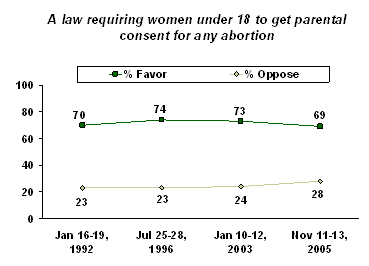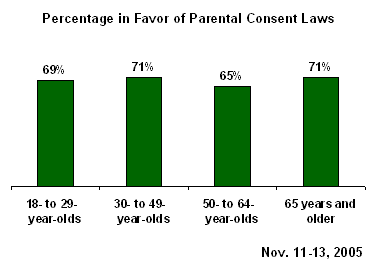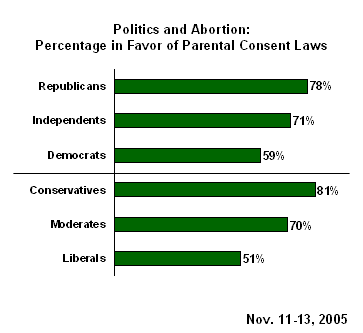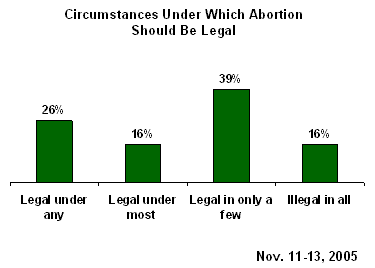GALLUP NEWS SERVICE
PRINCETON, NJ -- The fate of a New Hampshire law requiring parents of minor girls to be notified before their daughters can have an abortion now rests with the Supreme Court. Opening arguments in Ayotte v. Planned Parenthood of Northern New England begin Wednesday.
Most U.S. adults think parents should not just be notified, but should have to give their permission, before a minor daughter has an abortion. For more than a decade, Gallup has found roughly 7 in 10 Americans favoring laws that require women under 18 to receive parental consent for any abortion. The latest poll, conducted Nov. 11-13, finds 69% in favor and 28% opposed to such laws.

A recent Newsweek poll found even higher support -- 78% -- when the question focused on parental notification, asking respondents whether they would favor or oppose an abortion restriction law "requiring that parents of teenagers must be notified."
Broad-Based Appeal
Gallup finds a high level of support for parental consent laws by gender as well as among different age groups. Women are only slightly less likely than men to favor parental consent (65% of women vs. 74% of men). There are no significant differences by age, as roughly 7 in 10 young adults, middle-aged adults, and seniors favor the laws.

Support for such laws does vary according to partisan affiliation and political outlook; it is highest among Republicans and conservatives, and lowest among Democrats and liberals. Still, 59% of Democrats and a slim majority of liberals (51%) favor parental consent.

The popularity of parental involvement laws is evident in the fact that almost all states have them. According to Planned Parenthood, 44 states have laws requiring either parental notification or parental consent for minors seeking an abortion; but because of court challenges, such as the one that halted implementation of New Hampshire's law, only 35 are in effect.
The sticking point for New Hampshire's law, a point the Ayotte case will clarify, is whether parental consent laws must offer the same "health of the mother" exceptions that are required for laws that restrict abortions. The Supreme Court established this requirement in its 2000 decision nullifying a Nebraska ban on so-called partial-birth abortions; since then, lower courts have used this decision to strike down parental consent laws that fail to make the same exception.
Gallup consistently finds that Americans are sympathetic to "health of the mother" exceptions to abortion restrictions. In January 2003, 77% of Americans said abortion should be legal when the woman's physical health is endangered. Whether this belief influences Americans' reactions to the New Hampshire case as it becomes better known will be interesting to see.
The Broader Strategy to Limit Abortion
The significance of Ayotte extends well beyond parental consent. Court watchers say it could set important precedents for how future challenges to state abortion laws are handled by the lower courts, and that could be critical to the strategy of abortion opponents.
Rather than tackling a complete ban on abortion or a sweeping overthrow of Roe v. Wade -- which the public opposes -- abortion opponents have, in recent years, taken an incremental approach to reducing the number of legal abortions. Gallup and other survey organizations document public support for many of the resulting abortion restrictions now being debated in the legislatures and courts. These include parental consent laws, "informed consent" for women, spousal notification for husbands, and bans on partial-birth abortions.
More generally, a majority of Americans (55%) favor a restrictive approach to abortion laws -- saying abortion should be either legal "only in a few circumstances" or illegal in all circumstances, according to the latest poll. Just under half (42%) think it should be broadly legal -- either in all or most circumstances.

Attitudes about parental consent laws are clearly related to views about the legality of abortion. Opponents of abortion widely favor such laws. This includes more than four in five adults who believe abortion should be legal in only a few or no circumstances. However, rather than being solidly opposed to parental consent, abortion rights advocates are somewhat closely divided on the issue. Nearly half of those who think all abortions should be legal favor parental consent laws; just 52% oppose them. The majority (58%) of those who think abortions should be legal in most circumstances say they favor such laws.
|
Support for Parental Consent According to Position on Abortion |
||||
|
Position on Abortion |
||||
|
|
Legal |
Legal |
Legal only |
Illegal |
|
Parental Consent: |
% |
% |
% |
% |
|
Favor |
46 |
58 |
85 |
80 |
|
Oppose |
52 |
39 |
13 |
19 |
Survey Methods
These results are based on telephone interviews with a randomly selected national sample of 1,006 adults, aged 18 and older, conducted Nov. 11-13, 2005. For results based on this sample, one can say with 95% confidence that the maximum error attributable to sampling and other random effects is ±3 percentage points. In addition to sampling error, question wording and practical difficulties in conducting surveys can introduce error or bias into the findings of public opinion polls.
15. Do you think abortions should be legal under any circumstances, legal only under certain circumstances, or illegal in all circumstances?
|
|
Legal |
Legal only |
|
|
|
% |
% |
% |
% |
|
|
2005 Nov 11-13 |
26 |
56 |
16 |
2 |
|
|
|
|
|
|
|
2005 Jun 24-26 |
24 |
55 |
20 |
1 |
|
2005 May 2-5 |
23 |
53 |
22 |
2 |
|
2005 Mar 21-23 |
23 |
55 |
20 |
2 |
|
2004 May 2-4 |
24 |
56 |
19 |
1 |
|
2003 Oct 24-26 |
26 |
55 |
17 |
2 |
|
2003 May 5-7 |
23 |
57 |
19 |
1 |
|
2003 Jan 10-12 |
24 |
57 |
18 |
1 |
|
2002 May 6-9 |
25 |
51 |
22 |
2 |
|
2002 Mar 22-24 |
27 |
53 |
19 |
1 |
|
2002 Feb 8-10 |
26 |
54 |
18 |
2 |
|
2001 Aug 10-12 |
26 |
56 |
17 |
1 |
|
2001 May 10-14 |
26 |
58 |
15 |
1 |
|
2001 Mar 26-28 |
26 |
51 |
18 |
5 |
|
2000 Mar 30-Apr 2 |
28 |
51 |
19 |
2 |
|
2000 Jan 13-16 |
26 |
56 |
15 |
3 |
|
1999 Apr 30-May 2 |
27 |
55 |
16 |
2 |
|
1998 Jan 16-18 |
23 |
59 |
17 |
1 |
|
1997 Nov 6-9 |
26 |
55 |
17 |
2 |
|
1997 Aug 12-13 |
22 |
61 |
15 |
2 |
|
1996 Sep 20-22 ^ |
24 |
52 |
17 |
7 |
|
1996 Jul 25-28 |
25 |
58 |
15 |
2 |
|
1995 Sep 22-24 |
31 |
54 |
12 |
3 |
|
1995 Feb 24-26 |
33 |
50 |
15 |
2 |
|
1994 Sep 6-7 |
33 |
52 |
13 |
2 |
|
1994 Mar 28-30 |
31 |
51 |
15 |
3 |
|
1993 Mar 12-14 |
32 |
51 |
13 |
4 |
|
1992 Jul 23-24 ^† |
34 |
48 |
15 |
3 |
|
1992 Jan 16-19 |
31 |
53 |
14 |
2 |
|
1991 Sep 5-8 |
33 |
49 |
14 |
4 |
|
1991 May 30-Jun 2 |
32 |
50 |
17 |
1 |
|
1990 Apr 5-20 |
31 |
53 |
12 |
4 |
|
1989 Jul 6-9 |
29 |
51 |
17 |
3 |
|
1989 Jul 6-7 |
29 |
51 |
17 |
3 |
|
1989 Apr 12-13 † |
27 |
50 |
18 |
5 |
|
1988 Sep 25-Oct 1 |
24 |
57 |
17 |
2 |
|
1985 Jan 3-4 † |
21 |
55 |
21 |
3 |
|
1983 Jun 24-27 |
23 |
58 |
16 |
3 |
|
1981 May 8-11 |
23 |
52 |
21 |
4 |
|
1980 Jul 11-14 |
25 |
53 |
18 |
4 |
|
1979 Feb 23-26 |
22 |
54 |
19 |
5 |
|
1977 Dec 9-12 |
22 |
55 |
19 |
4 |
|
1975 Apr 4-7 |
21 |
54 |
22 |
3 |
|
|
|
|
|
|
|
^ Based on registered voters |
||||
|
† Gallup/Newsweek |
||||
16. (If certain circumstances) Do you think abortion should be legal in most circumstances or only in a few circumstances?
COMBINED RESPONSES (Q.15-16)
|
|
Legal |
Legal |
Legal only |
Illegal |
|
|
% |
% |
% |
% |
% |
|
|
2005 Nov 11-13 |
26 |
16 |
39 |
16 |
3 |
|
|
|
|
|
|
|
|
2005 Jun 24-26 |
24 |
15 |
40 |
20 |
1 |
|
2005 May 2-5 |
23 |
12 |
40 |
22 |
3 |
|
2005 Mar 21-23 |
23 |
14 |
39 |
20 |
4 |
|
2004 May 2-4 |
24 |
13 |
42 |
19 |
2 |
|
2003 Oct 24-26 |
26 |
14 |
40 |
17 |
3 |
|
2003 May 5-7 |
23 |
15 |
42 |
19 |
1 |
|
2003 Jan 10-12 |
24 |
14 |
42 |
18 |
2 |
|
2002 May 6-9 |
25 |
12 |
39 |
22 |
2 |
|
2002 Mar 22-24 |
27 |
12 |
40 |
19 |
2 |
|
2001 Aug 10-12 |
26 |
12 |
43 |
17 |
2 |
|
2001 May 10-14 |
26 |
15 |
41 |
15 |
3 |
|
2001 Mar 26-28 |
26 |
13 |
38 |
18 |
5 |
|
2000 Mar 30-Apr 2 |
28 |
11 |
38 |
19 |
4 |
|
2000 Jan 13-16 |
26 |
17 |
39 |
15 |
3 |
|
1999 Apr 30-May 2 |
27 |
12 |
42 |
16 |
3 |
|
1998 Jan 16-18 |
23 |
16 |
42 |
17 |
2 |
|
1997 Nov 6-9 |
26 |
15 |
40 |
17 |
2 |
|
1997 Aug 12-13 |
22 |
12 |
48 |
15 |
3 |
|
1996 Jul 25-28 |
25 |
13 |
43 |
15 |
4 |
|
1995 Sep 22-24 |
31 |
14 |
39 |
12 |
4 |
|
1995 Feb 24-26 |
32 |
9 |
41 |
15 |
3 |
|
1994 Sep 6-7 |
33 |
13 |
38 |
13 |
3 |
17. Next, do you favor or oppose each of the following proposals. How about -- [ITEMS A-B ROTATED, ITEM C READ LAST]
|
2005 Nov 11-13 |
|
|
|
A law requiring women under 18 to get parental consent for any abortion |
69% |
28 |
|
A law requiring that the husband of a married woman be notified if she decides to have an abortion |
64% |
34 |
|
A constitutional amendment to ban abortion in all circumstances, except when necessary to save the life of the mother |
37% |
61 |
Q.17 CONTINUED
Full Trends: Abortion Proposals
A. A law requiring women under 18 to get parental consent for any abortion
|
|
Favor |
Oppose |
No |
|
% |
% |
% |
|
|
2005 Nov 11-13 |
69 |
28 |
3 |
|
|
|
|
|
|
2003 Jan 10-12 |
73 |
24 |
3 |
|
1996 Jul 25-28 |
74 |
23 |
3 |
|
1992 Jan 16-19 |
70 |
23 |
7 |
B. A law requiring that the husband of a married woman be notified if she decides to have an abortion
|
|
Favor |
Oppose |
No |
|
% |
% |
% |
|
|
2005 Nov 11-13 |
64 |
34 |
2 |
|
|
|
|
|
|
2003 Jan 10-12 |
72 |
26 |
2 |
|
1996 Jul 25-28 |
70 |
26 |
4 |
|
1992 Jan 16-19 |
73 |
25 |
2 |
C. A constitutional amendment to ban abortion in all circumstances, except when necessary to save the life of the mother
|
|
Favor |
Oppose |
No |
|
% |
% |
% |
|
|
2005 Nov 11-13 |
37 |
61 |
2 |
|
|
|
|
|
|
2003 Jan 10-12 |
38 |
59 |
3 |
|
1996 Jul 25-28 |
38 |
59 |
3 |
|
1992 Jan 16-19 |
42 |
56 |
2 |
|
1984 |
50 |
46 |
4 |